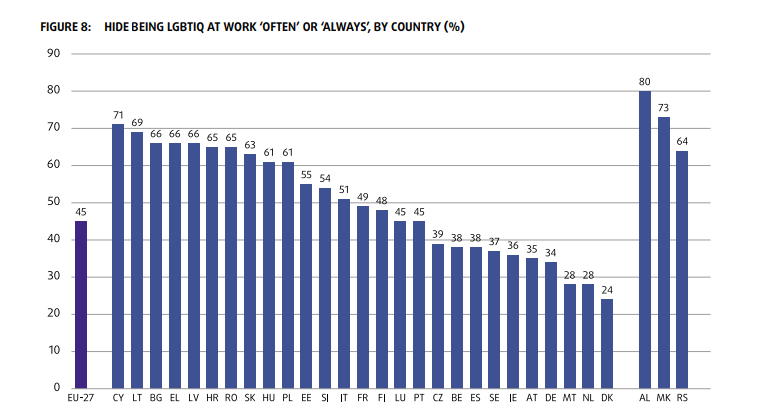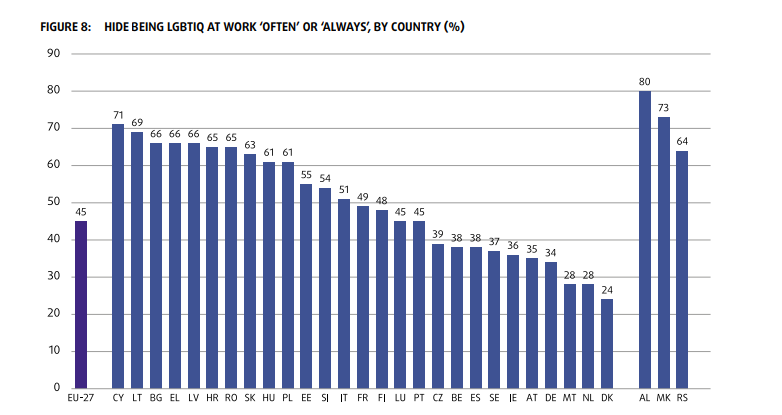Filenews 20 May 2024 - by Despina Psillou
Cyprus ranks first in discrimination, stigmatization and aversion against the LGBTI community among the 27 EU member states.
Seven out of ten concealed their sexual orientation, gender identity and gender expression from their work if it was incompatible with heterosexuals and their sexual gender.

73% of LGBTIQ students were ridiculed or bullied at school. 37% were confronted with conversion pseudotherapies. This is according to data from the report "LGBTIQ equality at a critical juncture: Progress and challenges", published today by the European Union Agency for Fundamental Rights, based on responses of more than 100,000 people. "I can't live freely and openly in my home because I think my parents will kick me out," an 18-year-old lesbian from Cyprus said during interviews about the research.
The biggest problem of discrimination due to their LGBTIQ identity in at least one area of life in the last 12 months before the survey was recorded in Cyprus and Belgium (48%). They are followed by Lithuania (46%), Slovakia (45%), Greece (44%), Poland (42%). The EU average is lowest (36%), while Sweden (21%), Finland (24%), Slovenia (28%), Denmark (28%), Estonia (29%) experienced the fewest discrimination.

Among members of the LGBTQ community, intersex (61%) faced the most discrimination. They are followed by transgender people (54%), lesbians (38%), gays (34%) and bisexual people (30%).
Cyprus' position is also dramatic in relation to discrimination against LGBTIQ people at work or while looking for work, with the percentage amounting to 37%, marking, in fact, a deterioration of six points compared to 2019 data. They are followed by Greece (28%), Slavakia and Bulgaria (27%), Poland (24%), Romania (24%), Hungary (23%). The EU average was 19%. Sweden (10%) has the lowest percentage, followed by Finland (11%), Estonia (13%), the Netherlands (13%) and Denmark (13%).
Almost every worker in Cyprus (71%) who belongs to the LGBTIQ community "often" or "always" keeps it a secret in their work, i.e. seven out of ten. They follow: Lithuania (69%), Bulgaria (66%), Greece (66%), Latvia (66%), Croatia (65%). The EU average is 45%, while the countries with the lowest rates are Denmark (24%), the Netherlands (28%), Malta (28%), Germany (34%), Austria (35%).
In terms of different areas of life, most discrimination is recorded in work (18%), catering and entertainment (17%), education (15%), provision of medical services, housing (12%), shops (11%), public services (11%), job search (9%), identification (4%), overall in all areas of life (37%).
Despite increased incidents of discrimination, a small percentage of LGBTIQ victims come forward. Malta (20%) leads the way, followed by Italy (16%), France (15%), Belgium (14%), Ireland (14%). Cyprus ranks 8th with the same percentage as the European average (11%). The fewest citations are made in Poland (5%), Hungary (6%), Czech Republic (6%).
Of these reports, 33% were made to the place where the incident took place, 14% to the employer, 9% to an LGBTIQ community organization or other support group, 8% to the police, 4% to an equality body and elsewhere.
The main reason victims did not report was because they believe nothing will change (49%). Also, that it is not worth reporting and that it happens all the time (37%). That they will not be taken seriously (33%). Because they do not trust the competent authorities (31%). Because they didn't want to reveal that they belonged to the LGBTQ community (26%) etc.
Nightmare at the Cypriot school
Almost every student of the LGBTIQ community was ridiculed or faced mockery, derision, insults and threats at the Cypriot school (73%), with Cyprus in third place in the ranking along with Austria. In fact, the phenomenon of school bullying against LGBTQI students in our country is rapidly deteriorating as an increase of 21 points is recorded compared to 2019 data.
In terms of the European ranking, Ireland ranks worst (76%), followed by Portugal (74%). The EU average stands at 67%, while the smallest problem is found in Czechia (52%), Slovenia (56%), Sweden (58%), Malta (59%), Slovakia (60%).
The exposure of LGBTIQ people in Cyprus to pseudo-conversion therapies is also taking on serious proportions, with these practices being institutionalized a criminal offence a year ago. Greece (38%) recorded the highest percentage, followed by Cyprus (37%), the Czech Republic (37%), Estonia (37%) and Slovakia (37%). The EU average is 24%.
When asked whether their country's government "definitely" or "probably" effectively combats prejudice or bigotry towards LGBTIQ people, Luxembourg ranks best (64%). They are followed by Malta (61%), Spain (58%), Belgium (55%), Denmark (53%). Cyprus is quite low, in 16th place (19%) and, at the same time, well below the EU average of 26%.
When asked whether they have experienced physical or sexual assault in the last five years, Bulgaria ranks worst (18%), followed by Latvia (17%), France (16%), Romania (16%), Denmark (16%). Our country is in 15th place with a percentage of 12%, recording an increase of three points compared to 2019 figures.
Increase in harassment and violence
A growing number of LGBTIQ people in Europe, according to the survey, are facing violence, harassment and intimidation. This phenomenon is exacerbated for younger LGBTIQ people, who are identified as particularly vulnerable.
Key findings of the survey include:
Freedom: More than one in two openly declare their LGBTIQ identity. However, most still avoid holding their partners' hands in public places for fear of being attacked.
Discrimination: More than one in three faces discrimination in their daily lives because of their LGBTIQ identity. However, only one in 10 reports discrimination.
Violence: More than one in 10 were victims of violence in the five years prior to the survey, slightly more than in 2019. In addition, more than one in three intersex people were attacked.
Harassment: More than one in two were victims of hate harassment. Two out of three intersex and transgender people were harassed.
Bullying: More than two out of three say they have been bullied at school in all EU countries. This is a sharp increase compared to one in two students in 2019.
Education: Schools are dealing with LGBTIQ issues more often than in the past. More than one in five LGBTIQ students say their school has addressed the issue in a positive way.
Mental health: More than one in three have considered suicide.
Pseudoconversion therapy: One in four said they were forced to follow conversion practices.
Governments: Only one in four believe their government is fighting prejudice and intolerance against LGBTIQ people.
